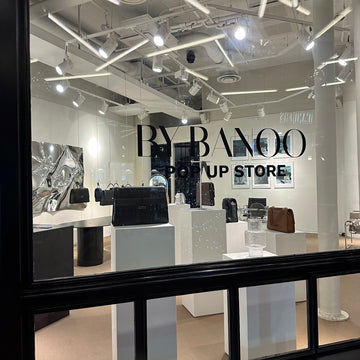Can you also relate to the feeling that you want to buy sustainable products but you don't know what to look for? I feel you. It's difficult to navigate when there are so many companies that sell products and promoting their sustainability initiatives.
Before we start, it's important to remember that sustainability can be divided in social, economical and environmental. When we talk about sustainability we tend to shift the focus towards environmental sustainability, which of course is valid since all production in some way has a negative impact on our planet. We are a part of a movement of brands that want to take responsibility and minimize the environmental harm as well as investing in sustainable choices.
Here are my 7 tips for you who want to be make better sustainable choices when buying things:
1. Buy less. It's much better to invest in high quality products that last longer. Even though they might initially be more expensive, the cost per usage will be much lower. Also, some products age well, such as leather products.
2. Learn if the brand is transparent with its production. Even if transparency itself isn't sustainable, it shows that the brand doesn't have a hidden agenda and hopefully is attempting to become more sustainable in the future. Today, many products that are sold in Europe are produced in Asia. For some reason companies are often not transparent with this - it's better to put the cards on the table and tell consumers why they have chosen Asia than to hide it.
3. Choose a brand with a local supply chain. Of course it can be difficult to know this if the brand doesn't write it on their website. If not - ask them! By minimizing transportation, we reduce CO2 emissions. Also, it's better to ship with boat and truck than an airplane from an environmental perspective.
4. Look at the price. If it's too good to be true, for example "wow, that's really cheap", then it can mean two things: 1. Poor quality and/or 2. Low wages for the factory workers. Remember that there is someone who makes your product, do you want to support poor working conditions? It's easier to ensure sustainable working conditions in EU due to enforced regulations and rules, but of course it can be possible to check this abroad as well.
5. Understand what material the product is made of. For leather products, leather lasts longer than vegan/plastic leather. Vegan leather is often communicated as a sustainable alternative, but it depends on what we mean with sustainability here. If we mean long lasting products then real leather is better (a by-product from the meat industry).
6. Watch out for greenwashing. If a company tries to compensate its existence by for example saying "buy our product and we will plant a tree", they are not really changing their way of producing their products, only making you believe that they're thinking about the environment. It would be better to say for example "We have decided to move our production from Asia to Europe" - THAT is a contribution to sustainability since their act will minimize distance in transportation which means less CO2.
7. Buy products that you really love. It's that easy. If you try a garment and it's not perfect - then don't buy it - or find a way to make it perfect by visiting a tailor. Often, these are the products that we regret that we have bought, and it ended up being a waste for both your wallet and the planet.
Let me know if you have any tips of your own when buying sustainable products.

Our first laptop bag model in the shape of a women's briefcase in the color Warm taupe.
















